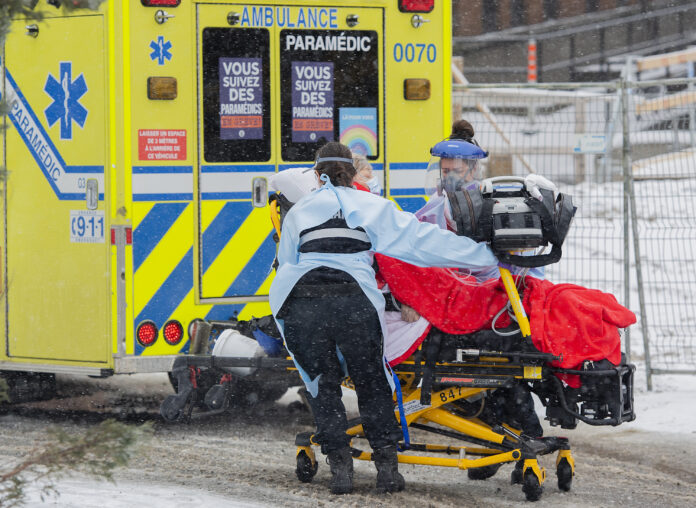Story continues below advertisement
Much of the current hospitalizations are being driven by Ontario and Quebec. Ontario reported 578 COVID-19 patients in intensive care units and 3,887 in hospital overall, up from 3,595 a day before. Quebec, meanwhile, reported a new record of 3,381 hospitalized COVID-19 patients, including 286 in ICUs.
Yet there have also been surges in other parts of the country. Alberta’s patient count on Monday surpassed 1,000 for the first time since mid-October, when the province was starting to recover from its deadly fourth wave of the pandemic. British Columbia and Manitoba set new records of 819 and 569 active COVID-19 patients, respectively.
Deaths, meanwhile, have also begun to rise. As of Monday, the seven-day average for new deaths from COVID-19 climbed to 116. Nearly 150 new deaths were reported Monday alone, though some occurred over the weekend.
Confirmed cases have begun to fall, meanwhile, giving hope that hospitalizations and deaths will soon follow.
As of Monday, the seven-day average of daily cases sits just above 29,300, down about 35 per cent from the record high of over 45,500 cases per day set nearly two weeks ago.
There are now roughly 331,000 active confirmed cases of COVID-19, down from over 400,000 early this month.
Story continues below advertisement
Federal and provincial health officials have warned, however, that the true number of cases across the country could be up to 10 times higher due to how infectious Omicron is. Provinces have restricted testing capacity to prevent labs from being overwhelmed.
Monday saw another development that officials hope could also drive hospitalizations down, as Health Canada approved Pfizer’s antiviral COVID-19 treatment after weeks of waiting.
Trending Stories
Canada deploys special forces to Ukraine amid rising tensions with Russia
Reality check: Could mail from Canada to China spread Omicron?
Story continues below advertisement
The agency authorized Paxlovid for adult patients with mild or moderate COVID-19 who are also at high risk of becoming more seriously ill. Health Canada did not authorize it for use on teenagers or on patients who are already hospitalized because of COVID-19.
Dr. Supriya Sharma, chief medical adviser with Health Canada, said clinical trials showed treatment with Paxlovid reduced the risk of hospitalization and death caused by COVID-19 by 89 per cent when the medications were started within three days of the beginning of symptoms, and by 85 per cent when taken within five days.
Health Canada’s approval recommends the pill is taken within five days after symptoms begin.
Procurement Minister Filomena Tassi told reporters Monday that obtaining Paxlovid will help keep Canada’s hospitalization figures from continuing to creep upwards.
“I think the timing of this (authorization) is also very important,” she said. “The bottom line is … it keeps people potentially out of the hospitals.”
Federal Health Minister Jean-Yves Duclos said Canada has already received its first shipment of 30,000 treatment courses of the Pfizer drug, with another 120,000 expected through March. He added that distribution to provinces and territories will begin “immediately.”
Story continues below advertisement
COVID-19: Health Canada’s chief medical advisor outlines use of Pfizer antiviral pill
Dr. Theresa Tam, Canada’s chief medical officer, said Paxlovid’s impact likely won’t be seen right away.
“A lot of it depends on the initial supply and we all know that the supply isn’t going to be great at the start,” she said. “For the Omicron wave itself, it may contribute, but it won’t be a key contributor to the current wave.
“So it is very much another layer, another tool as we progress over the next month.”
Tam said provinces and territories will determine how best to use limited supply of the drug, adding that deployment to jurisdictions will be based on a per-capita basis, adding Paxlovid should not be seen as an alternative to vaccinations.
Conservative Party Leader Erin O’Toole said the initial shipment of 30,000 treatment courses was “insufficient,” adding the government needs to “dramatically ramp up” the number of pills on order and get them out to the provinces immediately.
Story continues below advertisement
News of Paxlovid’s authorization came as Canadian students in four provinces returned to in-person learning, though a heavy winter snowstorm in parts of Ontario and Quebec meant another virtual school day for many.
Students in Nova Scotia and Manitoba also returned to class after starting the new year online because of record-high case counts. The provinces switched to remote learning to take pressure off the health-care system and give schools more time to improve safety measures.
Some Manitoba high-school students staged a walkout Monday to protest their return amid rising COVID-19 numbers. The students called for enhanced safety measures in classrooms, better access to masks and an option for online learning.
In Newfoundland and Labrador, meanwhile, officials are waiting at least another week to relax public health restrictions following a surge in COVID-19 that began in late December. The province moved to Alert Level 4 on Jan. 4 and will stay there until at least Jan. 24.
Peak of the fifth wave could be this week experts warn
Ahead of an official update set for Tuesday — the day public health restrictions are set to expire — British Columbia said it will keep gyms and other fitness centres closed indefinitely. School boards will also now have to collect information on the vaccination status of their staff.
Story continues below advertisement
To date, Canada has seen more than 2.8 million confirmed COVID-19 cases, with 31,679 deaths.
As of Monday, nearly 82 per cent of eligible Canadians aged five and up have been fully vaccinated against COVID-19 with two doses.
— with files from the Canadian Press
© 2022 Global News, a division of Corus Entertainment Inc.



